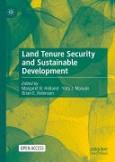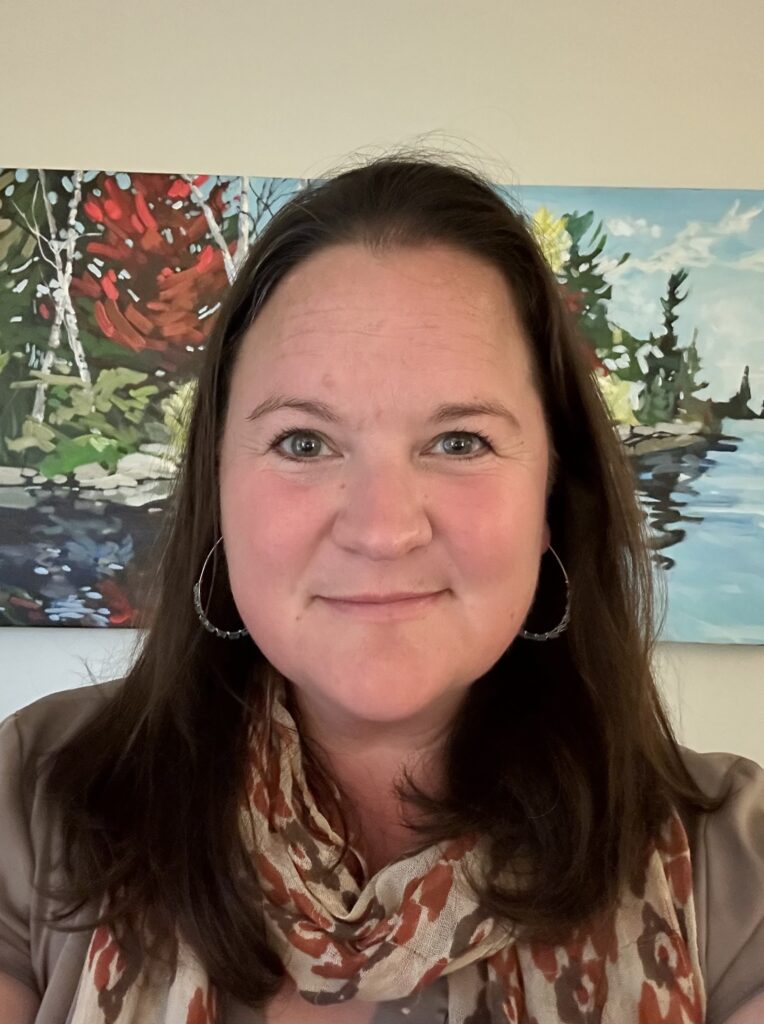Ph.D., University of Wisconsin-Madison, 2009
Associate Professor & Department Chair
211-M Sondheim Hall
mholland@umbc.edu
Research Interests
My scholarly interests rest, at a most fundamental level, on the intersections between rural livelihoods, land use dynamics, governance, and conservation strategies. To date, the majority of my research has situated itself in Latin America, with an added layer of focus on forests. Since 2017, I have engaged in research with colleagues in Mozambique, focused both on protected areas and community engagement, as well as a newer line of work on urban agriculture and green spaces. I collaborate actively with economists, geographers, conservation biologists, as well as conservation and development practitioners. The common thread in this interdisciplinary effort is a commitment to developing research that not only contributes to academic discourse, but also is relevant and practical, informing a specific policy or management dialogue.
Recent Research Activities
-
-
-
- Community benefit-sharing from wildlife conservation in Mozambican protected areas
- The influence of land tenure on forest change: lessons for conservation incentives and climate change policy in Ecuador
- Mapping subsistence agriculture and smallholder coffee landscapes in Central America to model adaptive capacity and vulnerability to climate change
- The influence of conservation management on poverty in Central America
- Challenges of trans-boundary environmental governance: the Mesoamerican Biological Corridor
-
-
Selected Publications
(Google Scholar and ResearchGate profiles)
Tabor, K.M.G.*, Stavros, N., Biehler, D., Castillo-Villamor, L.C., Mahmoudi, D., Moreno Amado, L.M., Holland, M.B. 2024. Digital equity in a crowded tool space: Navigating opportunities for equitable implementation of conservation technologies. Conservation Science and Practice, e13279.
Tabor, K.M.G.*, Stavros, N., Holland, M.B. 2024. Local conservation action requires ethical investments in global digital equity. Environmental Conservation, 1-11.
Holland, M.B., Masuda, Y.J., Robinson, B.E. (Eds). 2022. Land Tenure Security & Sustainable Development. Springer Link / Palgrave Macmillan Publishers. 329pp. (open access digital version). 
Masuda, Y.J., Robinson, B.E., Holland, M.B. 2022. Property Rights, Tenure Form, and Tenure Security. In: Holland, M.B., Masuda, Y.J., Robinson, B.E. (eds) Land Tenure Security and Sustainable Development . Palgrave Macmillan, Cham.
Sunderlin, W.D., Holland, M.B. 2022. A Historical Perspective on Land Tenure Security. In: Holland, M.B., Masuda, Y.J., Robinson, B.E. (eds) Land Tenure Security and Sustainable Development . Palgrave Macmillan, Cham.
Holland, M.B., Diop, M.*. 2022. Strategies for Securing Tenure: The Promise and Pitfalls of Formalization. In: Holland, M.B., Masuda, Y.J., Robinson, B.E. (eds) Land Tenure Security and Sustainable Development . Palgrave Macmillan, Cham.
Masuda, Y.J., Robinson, B.E., Holland, M.B., Tseng, TW.J., Frechette, A. 2022. Emerging Research Needs and Policy Priorities for Advancing Land Tenure Security and Sustainable Development. In: Holland, M.B., Masuda, Y.J., Robinson, B.E. (eds) Land Tenure Security and Sustainable Development . Palgrave Macmillan, Cham.
Dupre, S.I.*, Harvey, C.A. and Holland, M.B. 2022. The impact of coffee leaf rust on migration by smallholder coffee farmers in Guatemala. World Development, 156, p.105918.
Cheng, S.H., Costedoat, S., Sterling, E.J., Chamberlain, C., Jagadish, A., Lichtenthal, P., Nowakowski, A.J., Taylor, A., Tinsman, J., Canty, S.W. and Holland, M.B. 2022. What evidence exists on the links between natural climate solutions and climate change mitigation outcomes in subtropical and tropical terrestrial regions? A systematic map protocol. Environmental Evidence, 11(1), pp.1-17.
Tseng, T.W.J., Robinson, B.E., Bellemare, M.F., BenYishay, A., Blackman, A., Boucher, T., Childress, M., Holland, M.B., Kroeger, T., Linkow, B. and Diop, M.*, 2020. Influence of land tenure interventions on human well-being and environmental outcomes. Nature Sustainability, pp.1-10.
Etchart, N., J.L. Freire, M.B. Holland, K.W. Jones, L. Naughton-Treves. 2020. What happens when the money runs out? Forest outcomes and equity concerns following Ecuador’s suspension of conservation payments. World Development. DOI: 10.1013/j.worlddev.2020.105124.
Tabor, K.M.G* and M.B. Holland. 2020. Opportunities for improving conservation early warning and alert systems. Remote Sensing in Ecology and Conservation. DOI: 10.1002/rse2.163. Link to open access.
Jones, K.J., N. Etchart, M.B. Holland, L. Naughton-Treves, R. Arriagada. 2020. The impact of paying for forest conservation on tenure security in Ecuador. Conservation Letters. DOI:10.1111/conl.12710. Link to open access.
Masuda, Y.J., A.C. Kelly, B.E. Robinson, M.B. Holland, C. Bedford, M. Childress, E.T. Game, C. Ginsburg, T. Hilhorst, S.W. Lawry, D.A. Miteva, J. Musengezi, L. Naughton-Treves, W.D. Sunderlin, P. Veit. 2020. How do practitioners characterize land tenure security? Conservation Practice and Policy. e186. Link to open access.
Fagan, M.E., Reid, J.L., Holland, M.B., Drew, J.G. and Zahawi, R.A. 2020. How feasible are global forest restoration commitments?. Conservation Letters, p.e12700.
Lisboa, S.N., Woollen, E., Grundy, I.M., Ryan, C.M., Smith, H.E., Zorrilla-Miras, P., Baumert, S., Ribeiro, N., Vollmer, F., Holland, M. and Sitoe, A. 2020. Effect of charcoal production and woodland type on soil organic carbon and total nitrogen in drylands of southern Mozambique. Forest Ecology and Management, 457, p.117692.
Naughton-Treves, L., M.B. Holland. 2019. Losing ground in protected areas? Saving biodiversity requires reducing extractive pressures and engaging local communities in management. Science. 31 May 2019. Vol 364, Issue 6443. pp. 832-833.
Zähringer, J.G.; Beale, C.; Mayer, C.; Li, T.; Ceddia, M.G.; Veit, P.; Knoke, T.; Grafton, Q.; Meinzen-Dick, R.; Nkonya, E.; Robinson, B.; Holland, M.B. 2019. Land Rights in Sustainability. One Earth, 1(2), pp. 155-158. Elsevier 10.1016/j.oneear.2019.09.005
Selig, E.R., D.G. Hole, E.H. Allison, K.K. Arkema, M.C. McKinnon, J. Chu, A. de Sherbinin, B. Fisher, L. Gallagher, M.B. Holland, J.C. Ingram, N.S. Rao, R.B. Russell, T. Srebotnjak, L.C.L. Teh, S. Troeng, W.R. Turner, A. Zvoleff. 2018. Mapping global human dependence on marine ecosystems. Conservation Letters. DOI: 10.1111/conl.12617
Smith, D.A., M.B. Holland, A. Michon, A. Ibáñez, F. Herrera. 2017. The hidden layer of indigenous land tenure: Informal forest ownership and its implications for forest use and conservation in Panama’s largest collective territory. International Forestry Review.
Holland, M.B., S.I. Dupre*, J. Baker*, S. Lawry, A.E. Duchelle, A. Kelly, Y.J. Masuda, B.E. Robinson, 2017. How does indigeneity influence socio-ecological conditions in community forests?: A systematic review protocol (No. CIFOR Working Paper no. 234, p. 22p). Center for International Forestry Research (CIFOR), Bogor, Indonesia.
Robinson, B.E., Y.J. Masuda, A. Kelly, M.B. Holland, C. Bedford, M. Childress, D. Fletschner, E.T. Game, C. Ginsburg, T. Hilhorst, S. Lawry, D.A. Miteva, J. Musengezi, L. Naughton-Treves, C. Nolte, W.D. Sunderlin, P. Veit. 2017. Incorporating Land Tenure Security into Conservation. Conservation Letters. DOI: 10.1111/conl.12383
Robinson, B.E., M.B. Holland, L. Naughton-Treves. 2017. Community land titles alone will not protect forests. Proceedings of the National Academy of Sciences (PNAS). DOI: 10.1073/pnas.1707787114
Holland, M.B., K.W. Jones, J.L. Freire, M. Morales, L. Naughton-Treves, L. Suárez. 2017. Titling land to conserve forests: the case of Cuyabeno Reserve in Ecuador. Global Environmental Change.
Holland, M.B., and D. Lansing. 2017. Forests in limbo: assessing Costa Rica’s forest and land reform policies. Society and Natural Resources. DOI: 10.1080/08941920.2016.1257080
Holland, M.B., S.Z. Shamer*, P.A. Imbach, J.C. Zamora, C. Medellin, E. Leguia, C. Donatti, M.R. Martínez, C.A. Harvey. 2016. Mapping adaptive capacity and smallholder agriculture: applying expert knowledge at the landscape scale. Climatic Change, 1-15. doi:10.1007/s10584-016-1810-2.
Jones, K.W., M.B. Holland, L. Naughton-Treves, M. Morales, L. Suárez, K. Keelan*. 2016. Forest conservation incentives and deforestation in the Ecuadorian Amazon. Environmental Conservation. http://dx.doi.org/10.1017/S0376892916000308.
McKinnon, M., Cheng, S., Dupre, S.*, Edmond, J., Garside, R., Glew, L., Holland, M. B., Levine, E.,Masuda, Y., Miller, D., Oliveira, I., Revenaz, J., Roe, D., Shamer, S.*, Wilkie, D.,Wongbusarakum, S., Woodhouse, E. 2016. What are the effects of nature conservationon human well-being? A systematic map of empirical evidence from developing countries. Environmental Evidence.
Bottrill, M., S. Cheng, R. Garside, S. Wongbusarakum, D. Roe, M.B. Holland, J. Edmond, W.R. Turner. 2014. What are the impacts of nature conservation interventions on human well-being: a systematic map protocol. Environmental Evidence.
Holland, M.B., F. de Koning, M. Morales, L. Naughton-Treves, B. Robinson, L. Suárez. 2014 Complex tenure and deforestation: implications for conservation incentives in the Ecuadorian Amazon. World Development 55: 21-36.
Robinson, B., M.B. Holland, L. Naughton-Treves. 2014. Does secure land tenure save forests? A meta-analysis of the relationship between land tenure and tropical deforestation. Global Environmental Change 29:281-293.
Holland, M.B. 2011. The Role of Protected Areas for Conserving Biodiversity and Reducing Poverty (Volume 2, Chapter 18) in Ingram, J.C., F. DeClerck, C. Rumbaitis del Rio (Eds). 2011. Integrating Ecology and Poverty Reduction: The Application of Ecology in Development Solutions. Springer Link, New York, NY, pp. 253-272.
Andam, K., P. Ferraro, K. Sims, A. Healy, M.B. Holland. 2010. “Protected areas reduced poverty in Costa Rica and Thailand”. Proceedings of the National Academy of Sciences, 107(22):9996-10001.
Bruce, J., Holland, M., Lastarria-Cornhiel, S., Naughton-Treves, L., Robinson, B. and K. Wendland. 2010.*”Capítulo 3. Conceptos y términos clave relacionados con la tenencia y los derechos de propiedad en la conservación de bosques basada en incentivos directos”, pp. 61-83 en Seguridad en la tenencia dela tierra e incentivos para la conservación de bosques. Editors: M. Morales, L. Naughton-Treves y L.Suárez. ECOLEX (Corporación de Gestión y Derecho Ambiental).ISBSN: 95 pp.
Naughton-Treves, L., N. Alvarez-Berrios, K. Brandon, A. Bruner, M.B. Holland, C. Ponce, M. Saenz, L. Suarez, and A. Treves. 2006. “Expanding protected areas and incorporating human resource use: A study of 15 forest parks in Ecuador and Peru” Sustainability: Science, Practice, & Policy. 2(2):32-44.
Naughton-Treves, L., M.B. Holland, and K. Brandon. 2005. “The Role of Protected Areas in Conserving Biodiversity and Sustaining Local Livelihoods” Annual Review of Environment and Resources. 30:219-252.
Zimmerer, K., R.E. Galt, and M.V. Buck (Holland). 2004. “Globalization and the Coverage of Protected Areas (1980-2000): Trends at the World-Region and Country Levels”. AMBIO, Issue 8, December, 2004.
* : denotes graduate student co-author
Graduate Students
Ph.D. Students
In progress
- Valerie Pasión, expected 2027, Chair
- Tanja Crk (MEES/GES), expected 2026, Chair
- Anisha Jayadevan, expected 2026, Member
- Hasan Ahmed, expected 2026, Member
- Felipe Saad, expected 2026, Member
Graduated
Chair
- Karyn Tabor, 2023, Dissertation: Achieving multiple conservation goals with satellite-based monitoring and alert systems.
- Moustapha Diop, 2020, Dissertation: To Formalize or Not: Investigating Drivers of Landholders’ Decision to Formalize Land in Rural Sub Saharan Africa – The Case of Senegal.
- Samuel Dupre, 2019, Dissertation: Post-impact migration in Guatemalan coffee landscapes.
Committee Member
- Nicolle Etchart (U. Wisconsin-Madison), 2024, Member
- Jaime Barrett, 2024, Member
- Mariya Shcheglovitova, graduated 2020, Member
- Carlos Muñoz Brenes (U. Idaho), graduated 2017, Member
- Jared Margulies, graduated 2017, Member
MSc Students
In progress
- Kyra Madunich Arevalo, ICARE/GES, expected 2025, Chair
- Donovin Smith, ICARE/GES, expected 2025, co-Chair (with M. Baker)
Graduated
- Autumn Powell, ICARE/GES, 2024, Chair
- Molly Finch, ICARE/GES, expected 2024, Chair
- Jack Solomon, 2024, Chair (non-thesis option)
- Rob D’Amato, 2024, Chair (non-thesis option)
- Valerie Pasión, 2023, Chair
- Mackenzie (Bodman) Kirshbaum, 2023, Chair
- Selenea Gibson, 2023, Member
- Drew Powell, 2023, Member
- Natalia Figueredo, ICARE/GES, 2023, Chair
- Emma Gilligan, 2023, Chair
- Daniel Cunningham, 2019, Member
- John Brooks Binau, 2017, Chair (non-thesis option)
- Katherine Ralston, 2017, co-Chair (with M. Baker) (non-thesis option)
- Jordan Psaltakis, 2017, Reader
- Katelyn Miller, 2016, Chair
- Jennifer Mayo, 2015, Chair
- Kirsten McGovern, 2015, Member
- Lindsey Gordon, 2015, Member
- Alexandra Krach, 2014, Reader
- Sierra Shamer, 2014, co-Chair (with D. Lansing)
- Daniel Schall, 2014, Member
Courses Taught
- GES 120: Environmental Science & Conservation
- GES 337: Natural Resource Management
- GES 338: Changing Context of the Chesapeake Bay Watershed
- GES 350: Climate Change and Society – the context of Maryland (with Dr. Dawn Biehler)
- GES 437/637: Conservation and Development in the Tropics
- GES 462/662: Applications of GIS in Human-Environment Systems
- GES 400/600: Life on Land in Africa (Fall 2019)
- GES 700: Graduate seminar in Human-Environment Geography – (Fall 2014: Tropical Forest Transitions ; Fall 2016: Environmental Science <–> Policy Translations)
- GES 701: Introductory Graduate Seminar for Geography & Environmental Systems
Faculty-led Study Abroad Courses:
- GES 400/600: Conservation and Sustainable Development in Costa Rica (Field Course: Summer 2014)
- GES 400/600: Climate Change at the Forest-Water Nexus: Costa Rica (Field Course: Summer 2017), with Drs. Lee Blaney (COEIT) & Matt Fagan (GES)
- GES 400/600: Climate Change and Migration in Oaxaca, MX (Faculty-led field course: Summer 2025), with Dr. Yolanda Valencia
